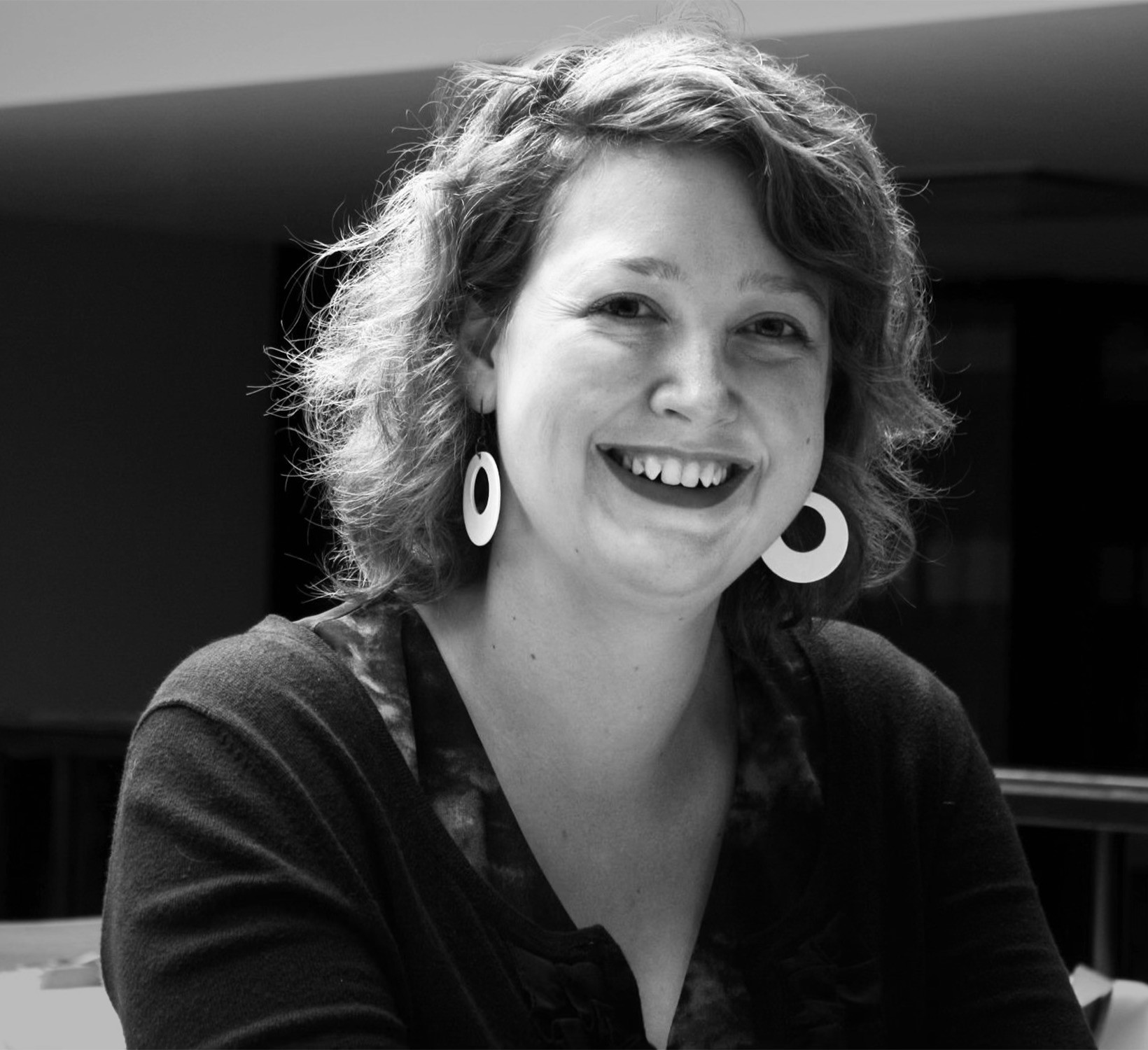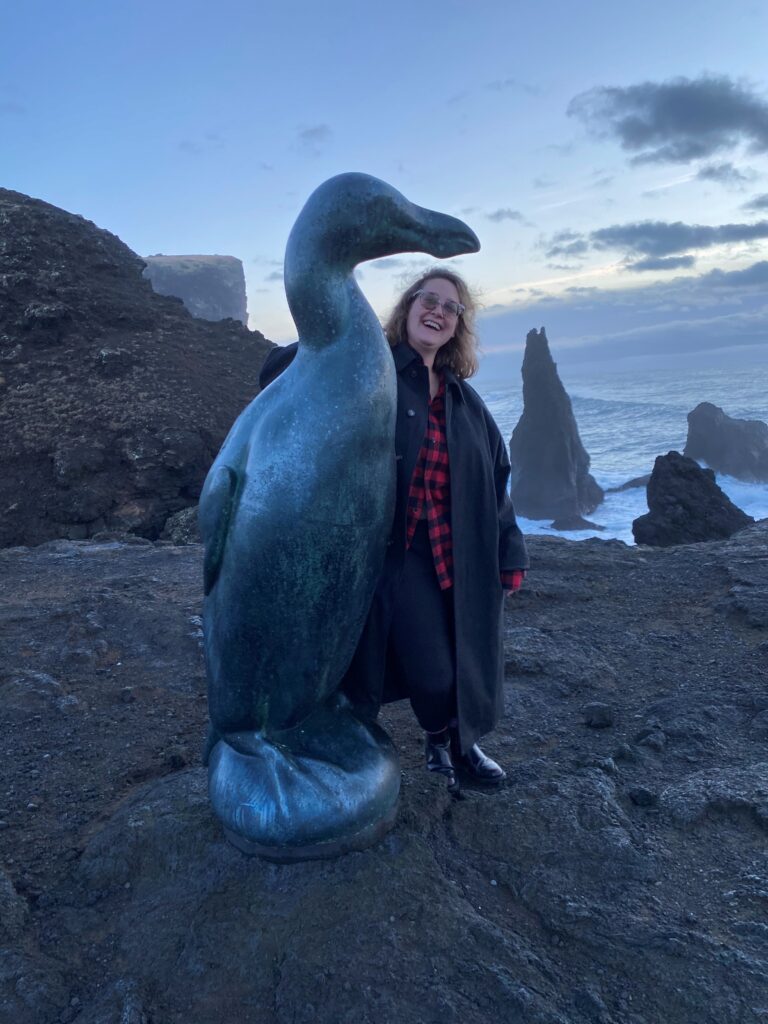Fulbright Gave Me the Confidence to Knock on Doors

Interview with literary translator Larissa Kyzer
We caught up with Brooklyn-based Larissa Kyzer, Fulbright Iceland fellow 2012-2013, just as her translation of Fríða Ísberg’s The Mark was being published this month – a must-read for lovers of Icelandic literature. Larissa has been a prolific translator of Icelandic writing these past years. Her translations include children’s books and chapter books for young readers, short stories, poetry, essays, plays, nonfiction, and novels. Larissa was awarded the American-Scandinavian Foundation’s Nadia Christensen Translation Prize in 2019 for her translation of Kristín Eiríksdóttir’s novel, A Fist or a Heart.
What initially drew you to Iceland, and why did you decide to apply for a Fulbright grant?
It’s literature! And more specifically, it’s contemporary literature.
When, at the ripe old age of 28, I applied for the Fulbright, I knew I wanted to be a literary translator, but my language skills were such that I also knew I was going to have to essentially start from scratch with a language. I decided the best way I could serve my larger, two-prong goal of both adding to the trove of international literature translated into English and ensuring that I’d have a niche in the professional landscape of literary translation, would be to find a home for myself in a language with a rich literary landscape but few English translators already working in it.
At the time, I was working at a university and had access to a fabulous library, so I basically started reading my way through the world literature section, looking for the national literature that would sing to me. I eventually hit upon Iceland and was extremely taken with what I read, although there wasn’t nearly as much variety in the English-language availability of Icelandic fiction then as there is now. But the books I read – to memory, titles such as Angels of the Universe by Einar Már Guðmundsson (trans. Bernard Scudder), Reply to a Letter from Helga by Bergsveinn Birgisson (trans. Philip Roughton), The Greenhouse by Auður Ava Ólafsdóttir (trans. Brian FitzGibbon), The Great Weaver of Kashmir by Halldór Laxness (trans. Philip Roughton), Jar City by Arnaldur Indriðason (trans. Bernard Scudder), The Pets by Bragi Ólafsson (trans. Janice Balfour), and Children in Reindeer Woods (trans. Lytton Smith) – were a revelation to me. I loved the off-kilter, dark humor, I loved the experimentation with language and narrative forms, I loved the freshness of the topics. I loved that literature was so central to Icelandic culture and the fact that Icelanders are proud of being a literary culture.
I was also lucky enough to cross paths with an Icelandic author and journalist Birna Anna Björnsdóttir, who had edited McSweeney’s so-called “Icelandic issue”. She gave me a copy of the issue, which included an excerpt from her own book, Dís (co-authored with Oddný Sturludóttir and Silja Hauksdóttir), as well as translations of work by Andri Snær Magnason, Guðbergur Bergsson, Gyrðir Elíasson, Þórarinn Eldjárn, Sjón, Hallgrímur Helgason, and others. And that pretty much sealed the deal for me.
As for why I decided to apply for a Fulbright: grant funding that would specifically support language acquisition was literally the only way I could make the leap and move to Iceland. It allowed me to find my footing and figure out how to then settle in for the next four years while I completed my studies at the University of Iceland, ultimately earning a master’s degree in Translation Studies.
Could you give us an insight into what it was like when you first arrived in Iceland (if it was your first time) and did anything come as a shock to you as you adapted to Icelandic society?
For one, I was surprised at how family-oriented Icelandic society is. New York City, where I’d moved from, is a city of transplants and while I have a lot of New York friends whose families live close by, I had still grown accustomed to a social milieu that was more friendship oriented. My own family lives in Arizona, some 2,500 miles away from New York, so I was already in the habit of spending holidays with friends. The idea that New Year’s Eve would be a holiday spent dressed up in your finest at home with your whole extended family instead of out at a gathering with friends had never occurred to me. So, coming to Iceland and discovering just how central a role family plays in social life was a surprise to me.
The second thing that was a real surprise to me was how self-motivated and self-guiding Icelanders are. In the U.S., you’re generally supposed to follow a set of rules or protocols for how to go about something, be it how to accomplish a specific task in your workplace, start a business or a club, or just not fall over the edge at a giant waterfall. A lot of these are unwritten rules, sure, but there still exists this idea that there is a right way of doing things. Fill out this form. Make this spreadsheet. Follow this path. Don’t step over that barrier and plummet into the canyon.
In Iceland, it’s completely different. If you want or need to do something, you just do it. You start the club. You figure out the best way to accomplish whatever task you’ve been assigned at work. You don’t lean over the edge of the waterfall. You make it work and you figure out your own way of doing it. When you’re new to the country and don’t know how anything works and don’t want to do anything “wrong” or culturally insensitive or awkward, this is very daunting. But once you get used to it, it’s rather liberating and empowering.

How did your experience as a Fulbrighter shape your time in Iceland? How has it helped you form connections with peers and colleagues in your field?
Being a Fulbrighter gave me the courage to approach people in Iceland that I probably wouldn’t have if I had just come on my own. It kick-started the process of getting to know people and finding my place in the country.
As one example: I reached out to Philip Roughton, a former Fulbright Scholar and translator who lived, and still lives, in the country, specifically because I was applying for the Fulbright. Philip has been an incredible mentor to me over the years, both professionally and personally. We are still friends to this day, and in this respect, it’s a relationship I have to thank Fulbright for.
As a grantee, you’re encouraged to develop a project that connects Icelandic and American communities, and so while I was in my grant year, I decided to establish the first Little Free Library in Iceland. This project gave me a reason to contact Icelandic organizations such as the Reykjavík UNESCO City of Literature Office, the Reykjavík City Library, the Icelandic Literature Center, and local literary scholars and publishers, almost all of whom I still have strong ties with today. It also was how I met Kári Tulinius, the poet/author who translated all of the materials for the Little Free Library into Icelandic for me. Kári is now a close friend and someone whose work I have spent nearly a decade translating. He was my first real friend in Iceland, the first person to take me to literary events and invite me to participate in the local literary scene. So that’s another relationship I wouldn’t have had if I hadn’t been a Fulbright grantee with that extra push to get out there and make the most of my grant year and meet people.
How have you been able to use your status as an alumnus of the Fulbright program to create further connections outside of Iceland?
Being a Fulbright grantee gives a person a certain stamp of approval or accreditation, if you will. People take you seriously in a way that would take a whole lot longer to build up to if it weren’t for the fact that you have received such a prestigious grant. Being a Fulbright grantee didn’t mean that I didn’t have to put in the same work into building professional connections in the U.S., but it has meant that when I came back from my time in Iceland, my expertise in Icelandic literature and my facility with the language was taken as something of a given because I had the endorsement of Fulbright. And it gave me the confidence to knock on doors that again I might not have knocked on otherwise.
Tell us a bit about your most recent project.
I’m really delighted that my latest novel translation – Fríða Ísberg’s The Mark – just came out with Faber in the UK and Text in Australia. It’s speculative fiction, a polyphonic novel narrated by four main narrators with very different perspectives and voices and was incredibly rewarding to translate. The Mark is about a near-future Iceland wherein society is getting ready to vote on whether or not to make a standardized “Empathy Test” mandatory for everyone. Should it be approved, those who pass will be “marked,” or listed in a public registry that affirms that they possess the baseline level of empathy to participate in society. Those who fail will have to undergo therapy and take various steps if they want to have the same access to everything from housing and bank loans to local grocery stores. It’s an issue that has divided society and Fríða explores the issue through the perspectives of her four narrators, plus a handful of other secondary characters. It’s a fantastic text for our time in terms of how it explores polarization and ethics, and it’s also just incredibly imaginative and well-written and fun to read. It was such a gift to work on and I’m so excited to have it out in the world now.
What projects are you working on currently?
I’m working on a number of very exciting projects, including a collaboration with Helen Cova, a Venezuelan immigrant to Iceland, on her poetry collection Poems for a Cloven Heart. Two poems will soon be published in Michigan Quarterly Review. I’m also at work on a translation of Kristín Eiríksdóttir’s Nordic Council-nominated book Tól (English title Exposure), as well as the novel’s play adaptation. And last but not least, I’m working on a collection of short stories by María Elísabet Bragadóttir, who I believe is writing some of the best short stories in Iceland right now and who was also nominated for the European Union’s Literature Prize this year. I can say without hesitation that I literally owe my career – and my whole relationship with Iceland – to Fulbright.
Visit www.larissakyzer.com for updates on Larissa’s translations.




